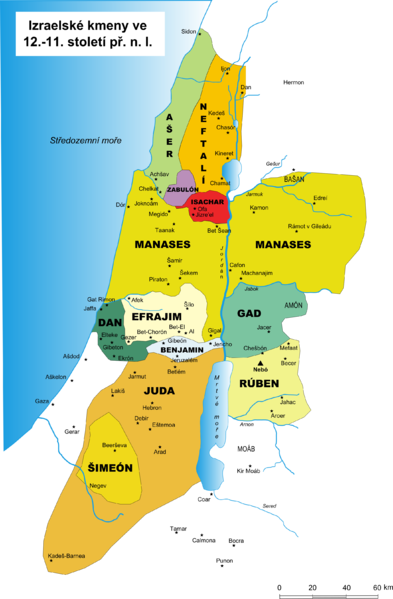Joshua 12-19 (The Origin of Judah)
So: please find below my summary of Joshua 12-19.
Which I lifted from a page on Wikipedia, that famous fount of information. That page also says that
... by the Bible's account, and archaeologically as well, the Israelites did not conquer the plains at that time; thus, those borders that run through the plains are nominal; they partition land that Israel did not possess.
Thanks, Wikipedia!
The above map begs an important question that I haven't yet addressed in this series: if Joshua's campaign never took place - and make no mistake, the verdict on that question is in - then how did these tribes actually come to Canaan?
Well, they didn't come from anywhere. The people who eventually identified themselves as Israel, a chosen people that had destroyed and replaced the vile Canaanite population formerly living in the Levant, were actually the latest generation of Canaanites themselves. At the risk of losing all credibility with you as a scholar (oh, wait - I have none! Well then, let's carry on!), I'm going to quote Wikipedia's summary of the question:
Since archaeological remains show a smooth cultural continuity in [Canaan in the Late Bronze Age], rather than the destruction of one culture (Canaanite) and replacement by another (Israelite), a large body of archaeologists believe that the Israelites were simply an emergent subculture within Canaanite society — i.e. that an Israelite conquest would be... logical nonsense — it would have involved the Canaanites invading themselves, from Canaan.
There is evidence that many Canaanite cities were suddenly destroyed in the Late Bronze Age, but believers in the Abrahamic religions err in taking it all as proof of an Israelite invasion. If they widened their perspective of the archaeological finds to include what was happening at the time in the Eastern Mediterranean as a whole, they'd understand that the finds are part of a greater mystery: the unsolved question of why every civilization in the Eastern Mediterranean abruptly collapsed in a very short period, with the exception (barely) of Egypt.
One tribe of desert-wanderers, who principally worshiped a god named YWH and who never ate pigs, did indeed "invade" and settle in Canaan during the Late Bronze Age. They didn't see it as an opportunity so much as a necessity; the collapse of civilization meant that the Canaanites were once again living at a subsistence level and didn't have extra grain and vegetables to trade for the wanderers' sheep. The desert-wanderers would now have to farm for themselves. This they did by settling in small villages throughout the central highlands of the Levant, laying down roots that would eventually turn them into a small, unwealthy nation named Judah. Because the highlands were so difficult to reach and held too few resources to make conquering their inhabitants worth it, it survived the new and powerful kingdoms that emerged around it.
This tribe of Judah was never part of a greater monarchy that included the far more wealthy kingdom of Israel to the north. They were clearly of the same ethnicity, as well as of the same breed as the other desert-wanderers who settled Edom, Moab, and Ammon. They once had a leader named David, famed for how brilliantly he led his army of habiru against the Israelites and Ammonites. Eventually they would come under the power of a theocratic regime led by the high priest Hilkiah and the king Hezekiah, who were determined to obliterate the traditional polytheism of their people.
They had big dreams, those men. They imagined a unified Canaan with its capital in Jerusalem, where the throne would always be occupied by a descendant of the House of David. To facilitate this expansion of Judah's power, a history was written, either over time or all at once, in which the many differing traditions of the Israelite and Judahite tribes were threaded together to form one narrative. This history showed that all of their revered ancestors - Abram/Abraham, Isaac, Jacob - were of one family, and thus so were they, and damn it, it was time to start acting like it by integrating into one political unit and reestablishing their independence from foreigners.
That didn't happen, of course. Judah's rebellion against its Assyrian master resulted in ruin, with only Jerusalem being spared thanks to a last-minute bribe. Later attempts by "YWHist" kings to throw off the yoke of foreign agents resulted in the exile to Babylon.
All of which you might say is a digression from Joshua 12-19, but I think it's related; both the chapters and this post are about how the mythic kingdom of Israel was originally organized. The chapters deal with the content of the myth itself and I've dealt here with the writing of it.
We'll return to the story of Joshua tomorrow. 'Til then.
NEXT TIME: I'll be honest with you. I'd have to read ahead to know.
SOURCES: Wikipedia, The Bible Unearthed by Israel Finkelstein and Neil Silberman
OTHER POSTS IN THIS SERIES:
This entry was tagged. Bible Commentary Joshua
